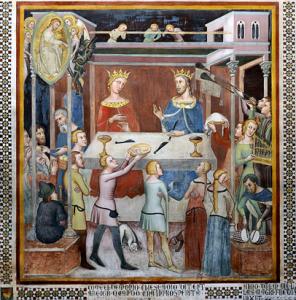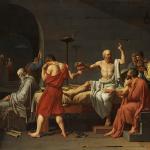 Reading old books can be good, just as reading more contemporary books is necessary. The old checks the new, the new illuminates errors in the old. A dialogue in our reading is necessary! As a defender of reading ancient books (do) I would not wish to be misunderstood: we must read contemporary books. My assumption is that we are immersed in this present age, but that immersion may not open us to diverse voices. Read broadly, especially in scholars or people you might not meet in daily life.
Reading old books can be good, just as reading more contemporary books is necessary. The old checks the new, the new illuminates errors in the old. A dialogue in our reading is necessary! As a defender of reading ancient books (do) I would not wish to be misunderstood: we must read contemporary books. My assumption is that we are immersed in this present age, but that immersion may not open us to diverse voices. Read broadly, especially in scholars or people you might not meet in daily life.
Read new books. My own goal is one to one. I read one old book (over three hundred years ago from many different cultures) to one new book (from now from many different cultures). I do try to understand what is happening in my own nation, inside my own language, first, since that is what I know best and must live first.
Reread the very best old and new books.
Why?
I have discovered that even after rereading a book thirty times, I discover new, simple errors I have made every time I have read the book. Read a book and then try “hearing” the same book read aloud and, if you are as I am, you discover that you have “self-edited” (skipping over certain parts) every time. Hearing Lord of the Rings forced me to realize how poetic (and beautiful) the text was and how I had skipped those bits I was too foolish to love or unable to fully grasp due to disability. As a fast reader (who also has a speech impediment with vowels), I also discovered a tendency to skip “names” and think of a person as the “L” elf or the “G” dwarf. Hearing the book helped me grasp the care Tolkien took in the formation of names. I knew this fact, but audiobooks helped me experience that new reality.
Cultural differences can be even harder to overcome. Old books come from times where our assumptions are not their assumptions. This year reading Iliad, again, I realized my error.
I cannot stop avoiding him as the kind of old blowhard that I am in danger of becoming, if I am not him already. I was not dumb enough to see that the text did not present him exactly as I experience him and so I warned myself (and students) about dismissing the old charioteer.
And yet I was not reading the book properly.
Homer may not share my hastiness with speech making. This is obvious if I consider a culture of spoken words as compared to our own culture of written word. Let me consider, just for a moment, how it would have been to know Nestor in that culture and not my own. The story teller like Nestor would be a repository of history. There would be no books to read about the past, just men like Nestor to remind us. The stories he told would have many advantages over written words. They would have life, because Nestor lived his adventures. They would have authority, because Nestor was there.
The story-telling culture rebukes my haste with Nestor. Look at this passage:
And this plan appeared best to his mind, to go to Nestor, Neleus’ son, first among men, that he might put together with him some perfect scheme, that would somehow avert destruction from all Danaans.20*
The King comes to Nestor for a “perfect scheme.” He will have to hear Nestor think out loud, but in an aural culture that is research. Nestor will call on the memory banks stored in his experience and in legends he has been told. He will use all of his experience, recollection, and so give a good plan. This works.
My condescension to Nestor (in the past) is an outer sign of my superficial understanding of the text. I am not in the world of the text and not learning until I see that Nestor is as Homer presents him: a wise man, indispensable, and worth hearing at all moments.
My modern chaff at the wiseman is folly. If I could find a truth-speaker, a living repository of knowledge, I should listen as he works his way to a plan. The process would be as good as the product.
* Homer. The Iliad (p. 197). Ecco. Kindle Edition.

















